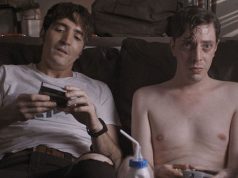The trailer for “Fight Club” was a great example of what a trailer should be. It established an interesting, quirky premise — two guys start a club where men get together just to hit each other — and then told us nothing else. We’re left to wonder, “OK, so they start a fight club — but THEN what happens?” Much better than the trailers that spoil the whole movie for you.
Having seen the movie, I now understand that this wasn’t just the film’s producers being coy: The film has so much to it, it’s actually ABOUT so much, they couldn’t have done the trailer any other way.
Oscar-worthy Edward Norton plays a lonely, insomniac nobody in a cookie-cutter, white-collar job. He truly is a nobody, too: We never learn his name (he’s listed in the credits as “Narrator,” which is one of his functions in the film). To find some purpose in life, he starts going to support groups for people with diseases he doesn’t have.
There he meets Marla (Helena Bonham Carter, looking absolutely unbathed), who’s doing the same thing. He also meets, on an airplane, a free-wheeling soap salesman named Tyler Durden (Brad Pitt). When Narrator’s condo is blown up by an arsonist, he moves in with Tyler in a condemned old house on the outskirts of town. By coincidence, Marla winds up being Tyler’s creepy girlfriend.
Then, just when the movie couldn’t get any weirder, Tyler and Narrator start a fistfight with each other just for fun. Soon it turns into a club, with everyone wanting to get together on Saturday nights to beat the crud out of each other. It’s all in good fun: Any fight participant can end the fight any time he wants to, and no one’s supposed to get permanently damaged. Just a way for men, repressed by society, to let loose with their natural instincts.
Which is ultimately what this movie is about. Tyler and Narrator, as inseparable pals, make a perfect pair, a living Id and Superego. Tyler helps Narrator get out of his depression and find friendship and acceptance — two things men in our day supposedly have no need for, even though they really do.
But what if men stopped being repressed and actually behaved the way their instincts tell them to? The fight club is the most basic outlet for such feelings; 100 years ago, when men fought all the time, it would have been unnecessary. So what happens now that we’ve been conditioned to think fighting is unacceptable? (“Most people,” the Narrator tells us, “will do anything to avoid a fight.”) Can you unleash just a little bit of primal rage without also unleashing a century’s worth of pent-up emotion and testosterone?
“Fight Club” answers that question, darkly, and the answer is no. Once you start, you can’t stop.
Tyler builds a frighteningly fascist army of fight club participants who work for him around the clock, engaging in amusing acts of mischief. (Newspaper headlines say things like “Police Seize Excrement Catapult” and “Fountain Befouled.”) It soon escalates into something far more disturbing — but, again, it seems to be the inevitable result when men’s inner urges are allowed to run free.
Director David Fincher (“The Game,” “Seven,” both of whose influence can be seen here) takes us on a twisted journey through the male psyche, full of flashbacks, freeze-frames, and eye-catching cinematography. Jim Uhls’s screenplay (based on Chuck Palahniuk’s novel) is clever and witty. There is delicious, ironic humor in Norton’s detached narrations, and the movie is undeniably funny — up until the last half-hour or so, when things get REALLY weird. It’s a compelling, entertaining film. Even when it’s nihilistic, pessimistic and macabre, it’s still eminently watchable and profound.
A (; )





